Ruth 4 meaning explained in AI Summary
Boaz meets with the other relative, who declines to redeem Ruth and Naomi's land. Boaz then publicly declares his intention to redeem them, marries Ruth, and they have a son named Obed. The book concludes with a genealogy tracing Obed's lineage to King David, highlighting Ruth's place in the lineage of the Messiah.
Chapter 4 of the Book of Ruth brings the story to a satisfying conclusion, focusing on redemption, kinship responsibility, and God's providence.
1. Boaz Secures the Right of Redemption:
- Boaz goes to the city gate, a public gathering place, and calls upon ten elders to witness his actions.
- He finds the closer relative, unnamed but referred to as "so-and-so," and presents him with the opportunity to redeem Elimelek's land and marry Ruth, thus preserving Naomi's family line.
- The closer relative is initially interested in the land but declines when he realizes it involves marrying Ruth, fearing it would jeopardize his own inheritance.
- Boaz, with the elders as witnesses, formally agrees to fulfill the role of kinsman-redeemer by purchasing the land and taking Ruth as his wife.
2. Boaz and Ruth's Marriage:
- Boaz publicly declares his intention to marry Ruth, invoking the name of the Lord and the blessings of the community.
- The elders and the people at the gate bless the union, praising Boaz for his kindness and praying for God's blessing on their marriage.
3. The Birth of Obed:
- Ruth and Boaz have a son named Obed, bringing joy to Naomi and continuing the family line.
- The women of Bethlehem celebrate with Naomi, recognizing Obed as a special child who will bring her comfort and security in her old age.
4. Genealogical Significance:
- The chapter concludes with a genealogy tracing Obed's lineage to David, establishing a direct link between Ruth and the future king of Israel.
Key Themes:
- Redemption: Boaz acts as a redeemer for Naomi and Ruth, restoring their land, providing security, and continuing the family line.
- Kinship Loyalty: Boaz goes above and beyond the call of duty to fulfill his obligations as a kinsman.
- God's Providence: Even though Ruth and Naomi faced hardship, God worked through seemingly ordinary events to provide for them and ultimately weave their story into the lineage of David.
Chapter 4 offers a heartwarming conclusion to the Book of Ruth, highlighting the importance of family, loyalty, and God's faithfulness even in difficult circumstances.
Ruth 4 bible study ai commentary
The overarching theme of Ruth 4 is redemption, fulfillment, and divine providence. It moves from a tense legal negotiation at the city gate to a joyous celebration of new life, culminating in a genealogy that places this small, personal story at the heart of Israel's—and the world's—salvation history. God's covenant faithfulness (hesed) is brought to its conclusion through the willing obedience of Boaz, the go'el (kinsman-redeemer), who acts decisively to restore the line of Elimelech and bring Naomi from emptiness to fullness.
Ruth 4 Context
The chapter's events take place at the city gate, the ancient Near East's center for legal, commercial, and social matters. Transactions required public witnesses (here, ten elders) to be legally binding. The central legal concept is the go'el, or kinsman-redeemer. This role combined two Old Testament laws: the redemption of family land that had been sold due to poverty (Leviticus 25:25) and the principle of Levirate marriage, where a man was to marry his deceased brother's childless widow to provide an heir for the dead man (Deuteronomy 25:5-10). While not a strict Levirate case (Boaz was not Mahlon's brother), the principle of preserving a family's "name" and "inheritance" is the driving force of the narrative.
Ruth 4:1-2
Now Boaz had gone up to the gate and sat down there. And behold, the kinsman-redeemer of whom Boaz had spoken came by. So Boaz said, “Turn aside, friend; sit down here.” And he turned aside and sat down. And he took ten men of the elders of the city and said, “Sit down here.” So they sat down.
In-depth-analysis
- The Gate: Boaz takes initiative, positioning himself in the public legal space. This contrasts with Ruth's nighttime meeting on the threshing floor, moving the story from private appeal to public, legal resolution.
- "Behold": The text emphasizes divine providence. The nearer kinsman just "happened" to come by at that exact moment.
- "Friend" (Hebrew: ploni almoni): Literally "so-and-so" or "a certain one." The man is intentionally left unnamed, a literary device that erases his identity from this redemptive story because he ultimately refuses to fulfill his duty. He is forgotten by history.
- Ten Elders: This establishes a formal, legal court. Ten men constituted a quorum (minyan) for public and religious matters, ensuring the transaction would be legally uncontestable.
Bible references
- Gen 23:17-18: "So the field of Ephron... was made over to Abraham as a possession in the presence of the Hittites, before all who went in at the gate of his city." (Legal transaction at the city gate)
- Deut 25:7: "...then his brother's wife shall go up to the gate to the elders..." (The gate as the place for Levirate disputes)
- Prov 31:23: "Her husband is known in the gates when he sits among the elders of the land." (Leadership and respect at the city gate)
Cross references
Deut 21:19 (elders' legal role), Zech 8:16 (judging truly in the gates), Psa 127:5 (sons defending at the gate).
Ruth 4:3-4
Then he said to the kinsman-redeemer, “Naomi, who has come back from the country of Moab, is selling the parcel of land that belonged to our relative Elimelech. So I thought I would tell you of it and say, ‘Buy it in the presence of those sitting here and in the presence of the elders of my people.’ If you will redeem it, redeem it. But if you will not, tell me, that I may know, for there is no one besides you to redeem it, and I am after you.” And he said, “I will redeem it.”
In-depth-analysis
- Strategic Approach: Boaz masterfully presents the proposition. He begins with the land, an attractive asset. This tests the kinsman's motives: is he interested in the property or in the family duty?
- "Our relative Elimelech": Boaz emphasizes their shared kinship and obligation to the deceased.
- The Offer: The language is formal and legal ("buy it in the presence of..."). It is a public and binding offer.
- The Acceptance: The nearer kinsman quickly agrees, "I will redeem it." He sees a straightforward, profitable land deal, unaware of the full obligation.
Bible references
- Lev 25:25: “If your brother becomes poor and sells part of his property, then his nearest redeemer shall come and redeem what his brother has sold.” (The law of land redemption)
- Jer 32:6-8: "...Hanameel my cousin will come to you and say, ‘Buy my field that is at Anathoth, for the right of redemption by purchase is yours.’” (Jeremiah fulfilling the role of a kinsman-redeemer for land)
Cross references
Num 27:8-11 (inheritance laws), Gen 23:3-4 (purchasing burial land).
Ruth 4:5-6
Then Boaz said, “The day you buy the field from the hand of Naomi, you also acquire Ruth the Moabite, the widow of the dead, in order to perpetuate the name of the dead in his inheritance.” Then the kinsman-redeemer said, “I cannot redeem it for myself, lest I impair my own inheritance. Take my right of redemption yourself, for I cannot exercise it.”
In-depth-analysis
- The True Cost: Boaz reveals the "catch." The land and Ruth are a package deal. The goal is not profit but to "perpetuate the name of the dead" (l'hakim shem hamet).
- The Refusal: The kinsman's reason is crucial: "lest I impair ('ashchith) my own inheritance." The word 'ashchith means to spoil, ruin, or destroy.
- "Impair my inheritance": This could mean several things:
- Economic Drain: Supporting two widows was costly.
- Succession Complication: A son born to Ruth would legally be Mahlon's heir and inherit Elimelech's land. This son might also later claim a share of the kinsman's own estate, reducing the inheritance for his existing children.
- Lineage Contamination: Marrying a Moabite could be seen as a risk, despite the legal allowance (Deut 23:3-6 applied to participation in the assembly, not explicitly to marriage for women).
- Contrast: The unnamed kinsman's self-interest ("my own inheritance") is in stark contrast to Boaz's selfless action, which mirrors God's hesed.
Bible references
- Deut 25:6: "...the first son whom she bears shall succeed to the name of his dead brother, that his name may not be blotted out of Israel." (The purpose of Levirate marriage)
- Gen 38:9: "But Onan knew that the offspring would not be his. So whenever he went in to his brother's wife he would waste the semen on the ground, so as not to give offspring to his brother." (An earlier refusal to perpetuate a brother's line, seen as wicked)
Cross references
Lev 25:25 (kinsman's obligation), Num 36:7 (preserving tribal inheritance), Deut 23:3 (prohibition against Moabites entering the assembly).
Ruth 4:7-8
Now this was the custom in former times in Israel concerning redeeming and exchanging: to confirm a transaction, the one drew off his sandal and gave it to the other, and this was the manner of attesting in Israel. So when the kinsman-redeemer said to Boaz, “Buy it for yourself,” he drew off his sandal.
In-depth-analysis
- The Sandal Ceremony: This act publicly symbolizes the transfer of a right or property. By giving Boaz his sandal, the kinsman is legally relinquishing his claim and right to redeem.
- Contextual Shift: In Deuteronomy 25:9, a widow pulls the sandal off the man who refuses her, which is an act of public shaming. Here, the man removes it himself in a neutral, contractual manner. The focus is on the legal transfer of rights, not shame.
Bible references
- Deut 25:9-10: "...she shall go up to him... pull his sandal off his foot, and spit in his face... And his name shall be called in Israel, ‘The house of him who had his sandal pulled off.’” (The sandal ceremony as public shaming)
Cross references
Psa 60:8 (possessing land by casting a sandal), Psa 108:9.
Ruth 4:9-10
Then Boaz said to the elders and all the people, “You are witnesses this day that I have bought from the hand of Naomi all that belonged to Elimelech and all that belonged to Chilion and to Mahlon. Also Ruth the Moabite, the widow of Mahlon, I have bought to be my wife, to perpetuate the name of the dead in his inheritance, that the name of the dead may not be cut off from among his brothers and from the gate of his native place. You are witnesses this day.”
In-depth-analysis
- Public Proclamation: Boaz publicly states the full scope of his redemptive act: he has acquired all the property and Ruth.
- "I have bought" (qaniti): This Hebrew word can mean to buy, acquire, or create. It's the same root word God uses in Genesis 14:19 ("Creator/Possessor of heaven and earth"). Boaz's acquisition is a creative, restorative act.
- Purpose Reiterated: Boaz makes the purpose explicit: to perpetuate the name of the dead. This is not for his own gain but for the sake of Mahlon and Elimelech's family line.
- From the Gate: "the gate of his native place" signifies that the deceased's civil identity and rights will be preserved within the community.
Bible references
- Isa 43:1: "Fear not, for I have redeemed you; I have called you by name, you are mine." (God as the ultimate redeemer who purchases His people)
- Eph 1:13-14: "...you were sealed with the promised Holy Spirit, who is the guarantee of our inheritance until we acquire possession of it..." (Believers as God's purchased possession)
Cross references
Isa 44:22 (God redeeming Israel), Tit 2:14 (Christ redeeming a people for himself), 1 Cor 6:20 (bought with a price).
Ruth 4:11-12
Then all the people who were at the gate and the elders said, “We are witnesses. May the LORD make the woman, who is coming into your house, like Rachel and Leah, who together built up the house of Israel. May you act worthily in Ephrathah and be renowned in Bethlehem, and may your house be like the house of Perez, whom Tamar bore to Judah, because of the offspring that the LORD will give you by this young woman.”
In-depth-analysis
- Community Blessing: The transaction is sealed with a powerful communal blessing, validating the union in the eyes of God and man.
- Rachel and Leah: Invoking the matriarchs of the twelve tribes elevates Ruth to the status of a foundational mother in Israel. It's a prayer for great fruitfulness.
- Tamar and Perez: This is a radical and grace-filled comparison. Tamar secured her heir through an unconventional, even scandalous, act (Gen 38). By invoking her, the people place Ruth's unconventional foreign origin and assertive action in a positive, righteous light. It legitimizes the union and foreshadows great things from it. Perez became the ancestor of the tribe of Judah, the royal line.
- Bethlehem: The blessing is specific to Bethlehem, foreshadowing its future significance as the city of David and the Messiah.
Bible references
- Gen 29-30: The story of Rachel and Leah building the house of Israel through their children. (National fruitfulness)
- Gen 38: The account of Tamar securing her lineage through Judah, bearing Perez. (Unconventional means for a righteous end)
- Micah 5:2: “But you, O Bethlehem Ephrathah... from you shall come forth for me one who is to be ruler in Israel...” (Prophetic significance of Bethlehem)
Cross references
Gen 24:60 (blessing on Rebekah for fruitfulness), Psa 128:3 (a fruitful vine), Gen 48:15-16 (Jacob's blessing).
Ruth 4:13-17
So Boaz took Ruth, and she became his wife. And he went in to her, and the LORD gave her conception, and she bore a son... And the women said to Naomi, “Blessed be the LORD, who has not left you this day without a kinsman-redeemer, and may his name be renowned in Israel! He shall be to you a restorer of life and a nourisher of your old age...Then Naomi took the child and laid him on her bosom and became his nurse. And the women of the neighborhood gave him a name, saying, “A son has been born to Naomi.” They named him Obed. He was the father of Jesse, the father of David.
In-depth-analysis
- "The LORD gave her conception": This is the climax of God's action in the book. Human plans and faithfulness (Boaz's hesed) come to fruition only through divine intervention. Ruth was likely childless in her previous 10-year marriage, making this act even more significant.
- Full Circle for Naomi: The women's blessing directly reverses Naomi's lament in chapter 1. She who was empty is now full. She who had lost a husband and sons now has a grandson who is a "restorer of life" (nefesh) and a "nourisher of... old age."
- "A son has been born to Naomi": Legally, the child is Mahlon's heir. Emotionally and socially, he is Naomi's redeemer. She takes him to her bosom, a picture of profound comfort and restoration.
- Obed: The name means "servant" or "worshiper." He will serve to continue the family line and serve God's ultimate redemptive plan.
- The Line of David: The narrative explicitly states the child's identity, bridging the gap from the family story to the national one.
Bible references
- Gen 29:31: "When the LORD saw that Leah was hated, he opened her womb, but Rachel was barren." (God's sovereignty over conception)
- Psa 113:9: "He gives the barren woman a home, making her the joyous mother of children. Praise the LORD!" (God reversing barrenness)
- Luke 1:58: "And her neighbors and relatives heard that the Lord had shown great mercy to her, and they rejoiced with her." (Community joy at the birth of John the Baptist)
Cross references
1 Sam 1:19-20 (Hannah's conception), Luke 2:28-30 (Simeon taking Jesus in his arms), Isa 9:6 (a son is given).
Ruth 4:18-22
Now these are the generations of Perez: Perez fathered Hezron, Hezron fathered Ram, Ram fathered Amminadab, Amminadab fathered Nahshon, Nahshon fathered Salmon, Salmon fathered Boaz, Boaz fathered Obed, Obed fathered Jesse, and Jesse fathered David.
In-depth-analysis
- The Toledot (Genealogy): This genealogy is the theological punchline of the entire book. It frames the story of love, loyalty, and redemption within God's grand plan for Israel's monarchy.
- Perez to David: It intentionally links this story back to the "scandalous" grace of Tamar (Gen 38) and forward to Israel's greatest king.
- Purpose of the Book: The genealogy reveals that the Book of Ruth was preserved to explain and legitimize the lineage of King David, showing that a faithful Moabite woman was his great-grandmother, a stunning inclusion of a Gentile in the royal line.
- Messianic Trajectory: This genealogy is picked up directly in the New Testament, placing Ruth squarely in the lineage of the Messiah.
Bible references
- Matt 1:3-6: "...and Judah the father of Perez and Zerah by Tamar, and Perez the father of Hezron... and Salmon the father of Boaz by Rahab, and Boaz the father of Obed by Ruth, and Obed the father of Jesse, and Jesse the father of David the king." (The fulfillment of this lineage in Jesus Christ)
- Luke 3:31-33: Traces Jesus' lineage back through David and Boaz. (Luke's genealogy)
- 1 Chr 2:3-15: A parallel Old Testament genealogy confirming the line of Judah to David. (Historical record)
Cross references
Gen 5 (first toledot), Gen 11:10-26 (Shem to Abram), Num 1:7 (Nahshon as leader of Judah).
Ruth Chapter 4 Analysis
- Typology of Boaz: Boaz is one of the clearest "types" of Christ in the Old Testament. He is the go'el (kinsman-redeemer) who is able, willing, and acts at a great price to himself to redeem a destitute and foreign bride, give her a new name, a new inheritance, and bring her into his family. (cf. Eph 5:25-27).
- The Two Redeemers: The unnamed kinsman ("Mr. So-and-so") represents the Law. The Law can point out the problem (the need for redemption) but is ultimately powerless to save because it is constrained by self-interest and cannot provide the ultimate solution (cf. Rom 8:3). Boaz represents Grace, who does what the Law could not. He goes beyond the letter of the law to fulfill its spirit out of hesed (loving-kindness).
- Gentile Inclusion: The book is a powerful polemic against the kind of rigid nationalism that arose after the exile (seen in Ezra-Nehemiah). It demonstrates that God's plan has always included people from all nations, placing a Moabite woman (and Rahab the Canaanite, Matthew 1:5) in the direct line of the Messiah.
- Emptiness to Fullness: The entire book arcs from Naomi's declaration, "I went away full, and the LORD has brought me back empty" (Ruth 1:21) to this chapter, where "a son is born to Naomi," filling her arms, her home, and her future with hope. This is a microcosm of the gospel story.
- Hidden Providence: While God is only mentioned directly as the one who "gave her conception," His hand is evident throughout, from the "chance" meeting in chapter 2 to the kinsman happening by the gate at the right time. God works through the faithful, ordinary actions of his people to accomplish his extraordinary purposes.
Ruth 4 Summary
Boaz proceeds to the city gate to legally settle the matter of redemption. He confronts the nearer kinsman, who agrees to buy Elimelech's land but refuses when he learns the deal includes marrying Ruth the Moabite. Through the sandal ceremony, the kinsman transfers his right to Boaz, who publicly declares his intention to marry Ruth to preserve the family line. Blessed by the elders, Boaz and Ruth marry, and God grants them a son, Obed. This child restores Naomi's hope and is celebrated as her own. The book concludes with a crucial genealogy, revealing Obed as the grandfather of King David, thus weaving this intimate family story into the epic narrative of Israel's royal and messianic line.
Ruth 4 AI Image Audio and Video


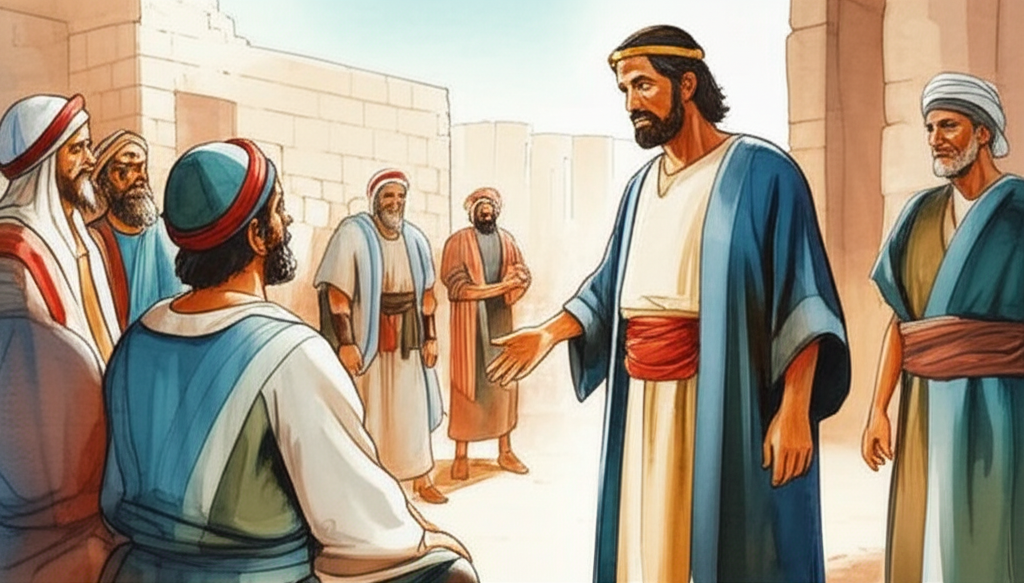
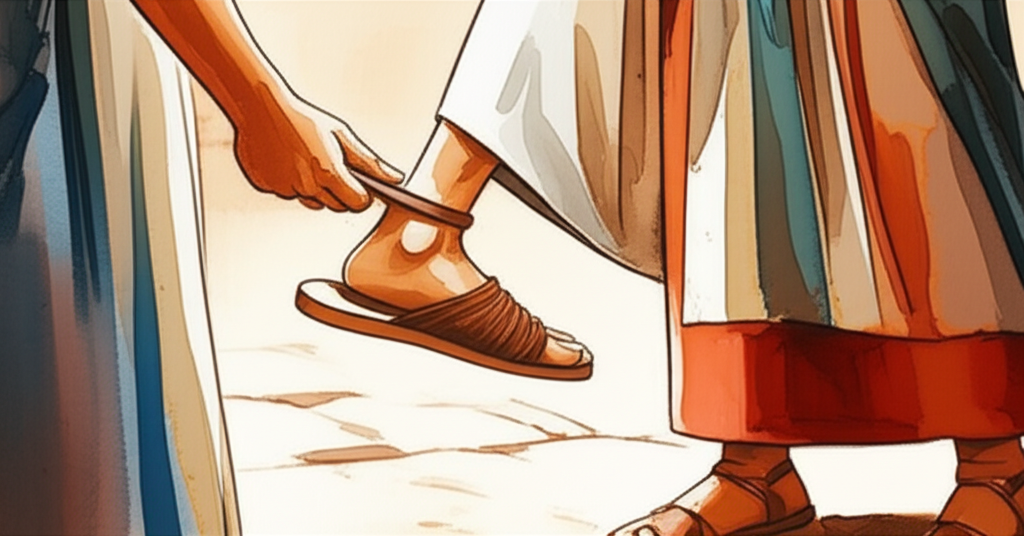
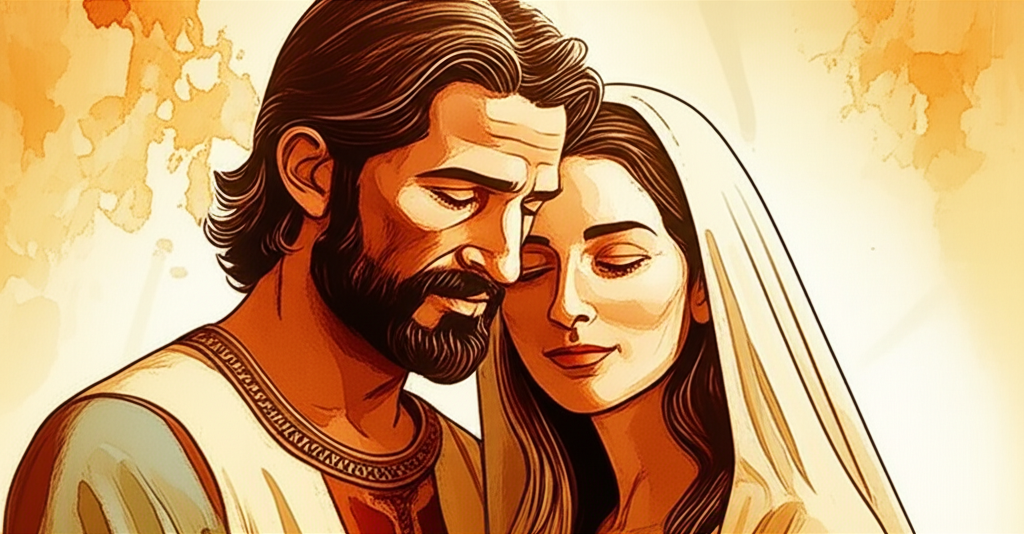
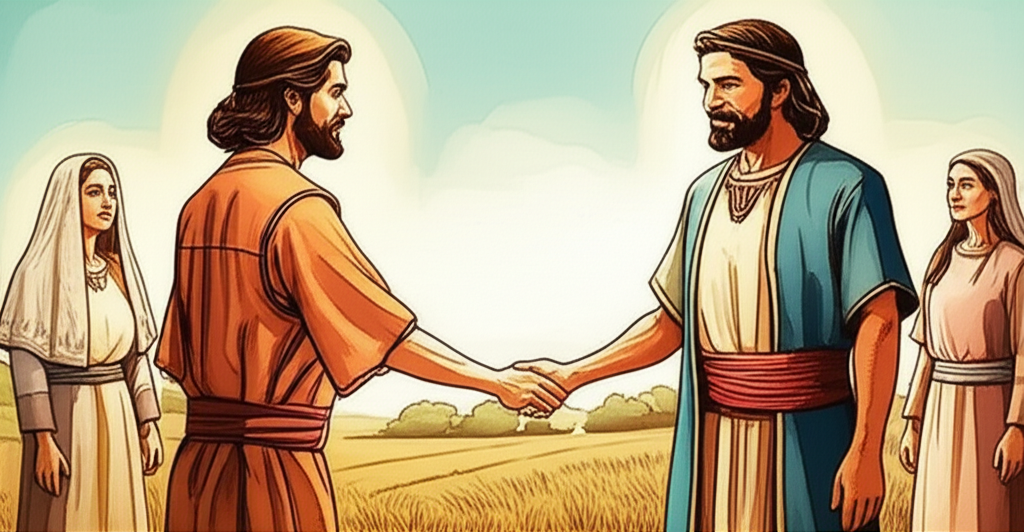
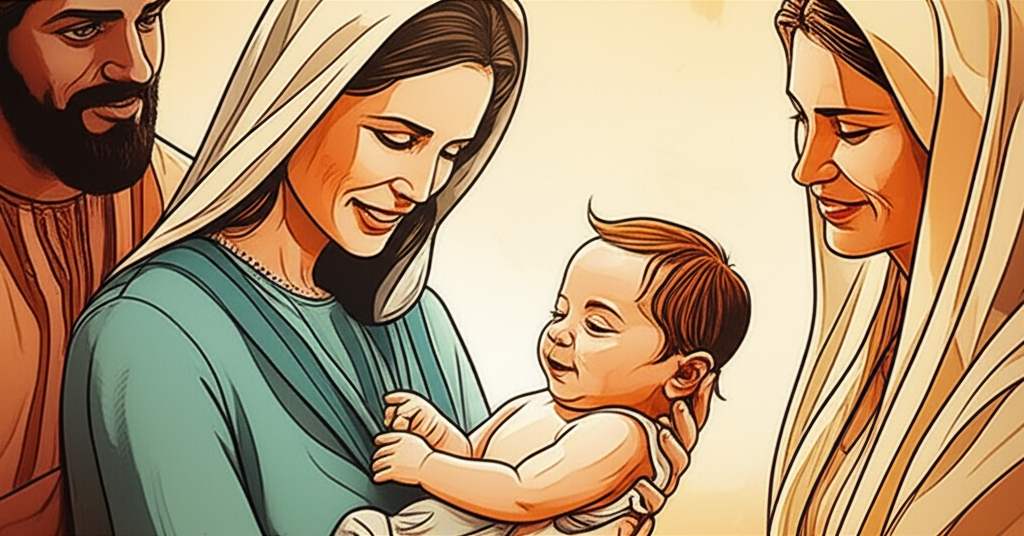
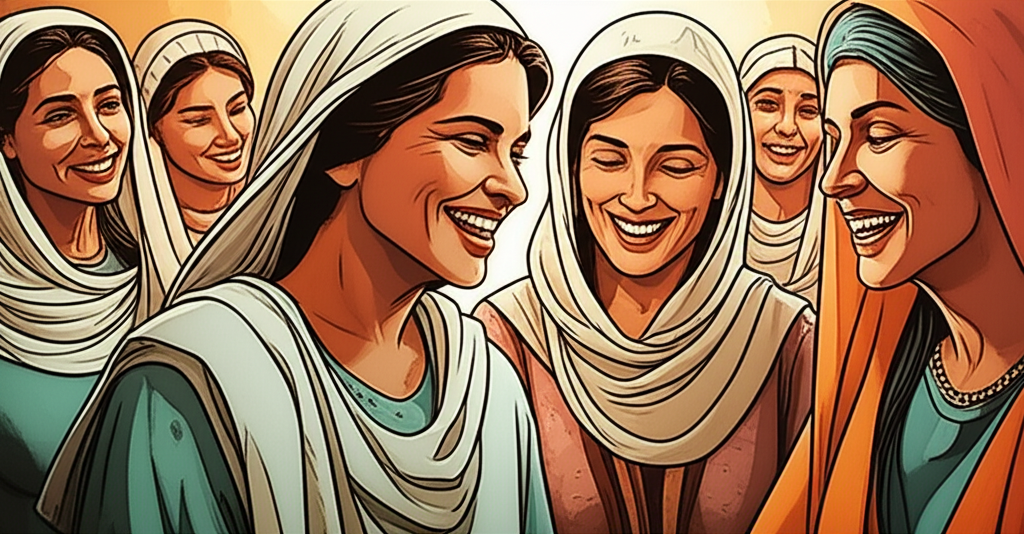
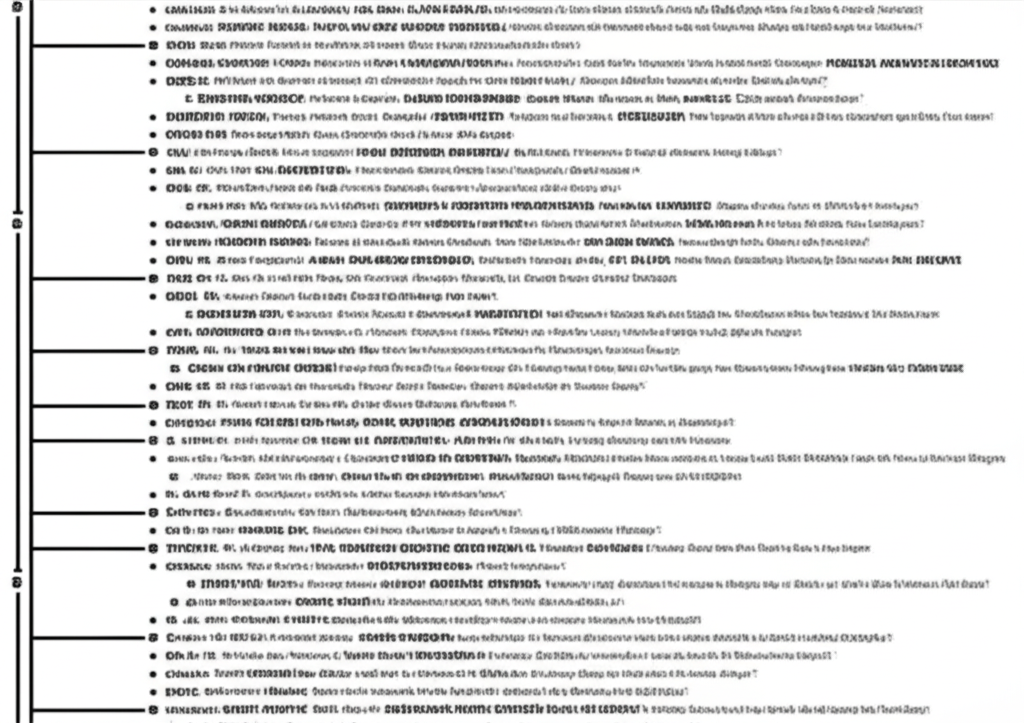
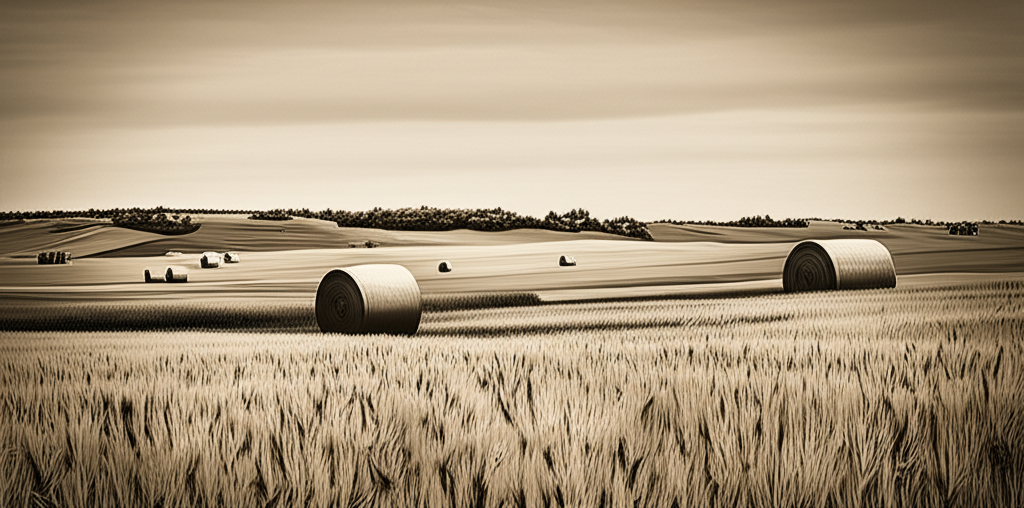
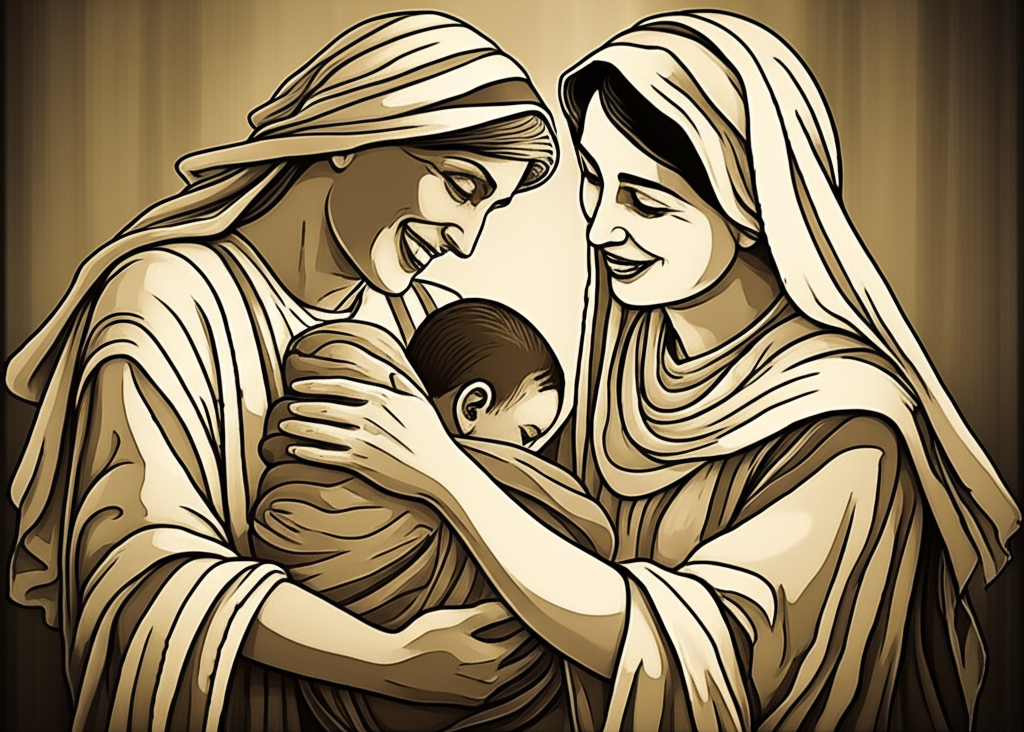
Ruth chapter 4 kjv
- 1 Then went Boaz up to the gate, and sat him down there: and, behold, the kinsman of whom Boaz spake came by; unto whom he said, Ho, such a one! turn aside, sit down here. And he turned aside, and sat down.
- 2 And he took ten men of the elders of the city, and said, Sit ye down here. And they sat down.
- 3 And he said unto the kinsman, Naomi, that is come again out of the country of Moab, selleth a parcel of land, which was our brother Elimelech's:
- 4 And I thought to advertise thee, saying, Buy it before the inhabitants, and before the elders of my people. If thou wilt redeem it, redeem it: but if thou wilt not redeem it, then tell me, that I may know: for there is none to redeem it beside thee; and I am after thee. And he said, I will redeem it.
- 5 Then said Boaz, What day thou buyest the field of the hand of Naomi, thou must buy it also of Ruth the Moabitess, the wife of the dead, to raise up the name of the dead upon his inheritance.
- 6 And the kinsman said, I cannot redeem it for myself, lest I mar mine own inheritance: redeem thou my right to thyself; for I cannot redeem it.
- 7 Now this was the manner in former time in Israel concerning redeeming and concerning changing, for to confirm all things; a man plucked off his shoe, and gave it to his neighbor: and this was a testimony in Israel.
- 8 Therefore the kinsman said unto Boaz, Buy it for thee. So he drew off his shoe.
- 9 And Boaz said unto the elders, and unto all the people, Ye are witnesses this day, that I have bought all that was Elimelech's, and all that was Chilion's and Mahlon's, of the hand of Naomi.
- 10 Moreover Ruth the Moabitess, the wife of Mahlon, have I purchased to be my wife, to raise up the name of the dead upon his inheritance, that the name of the dead be not cut off from among his brethren, and from the gate of his place: ye are witnesses this day.
- 11 And all the people that were in the gate, and the elders, said, We are witnesses. The LORD make the woman that is come into thine house like Rachel and like Leah, which two did build the house of Israel: and do thou worthily in Ephratah, and be famous in Bethlehem:
- 12 And let thy house be like the house of Pharez, whom Tamar bare unto Judah, of the seed which the LORD shall give thee of this young woman.
- 13 So Boaz took Ruth, and she was his wife: and when he went in unto her, the LORD gave her conception, and she bare a son.
- 14 And the women said unto Naomi, Blessed be the LORD, which hath not left thee this day without a kinsman, that his name may be famous in Israel.
- 15 And he shall be unto thee a restorer of thy life, and a nourisher of thine old age: for thy daughter in law, which loveth thee, which is better to thee than seven sons, hath born him.
- 16 And Naomi took the child, and laid it in her bosom, and became nurse unto it.
- 17 And the women her neighbors gave it a name, saying, There is a son born to Naomi; and they called his name Obed: he is the father of Jesse, the father of David.
- 18 Now these are the generations of Pharez: Pharez begat Hezron,
- 19 And Hezron begat Ram, and Ram begat Amminadab,
- 20 And Amminadab begat Nahshon, and Nahshon begat Salmon,
- 21 And Salmon begat Boaz, and Boaz begat Obed,
- 22 And Obed begat Jesse, and Jesse begat David.
Ruth chapter 4 nkjv
- 1 Now Boaz went up to the gate and sat down there; and behold, the close relative of whom Boaz had spoken came by. So Boaz said, "Come aside, friend, sit down here." So he came aside and sat down.
- 2 And he took ten men of the elders of the city, and said, "Sit down here." So they sat down.
- 3 Then he said to the close relative, "Naomi, who has come back from the country of Moab, sold the piece of land which belonged to our brother Elimelech.
- 4 And I thought to inform you, saying, 'Buy it back in the presence of the inhabitants and the elders of my people. If you will redeem it, redeem it; but if you will not redeem it, then tell me, that I may know; for there is no one but you to redeem it, and I am next after you.' " And he said, "I will redeem it."
- 5 Then Boaz said, "On the day you buy the field from the hand of Naomi, you must also buy it from Ruth the Moabitess, the wife of the dead, to perpetuate the name of the dead through his inheritance."
- 6 And the close relative said, "I cannot redeem it for myself, lest I ruin my own inheritance. You redeem my right of redemption for yourself, for I cannot redeem it."
- 7 Now this was the custom in former times in Israel concerning redeeming and exchanging, to confirm anything: one man took off his sandal and gave it to the other, and this was a confirmation in Israel.
- 8 Therefore the close relative said to Boaz, "Buy it for yourself." So he took off his sandal.
- 9 And Boaz said to the elders and all the people, "You are witnesses this day that I have bought all that was Elimelech's, and all that was Chilion's and Mahlon's, from the hand of Naomi.
- 10 Moreover, Ruth the Moabitess, the widow of Mahlon, I have acquired as my wife, to perpetuate the name of the dead through his inheritance, that the name of the dead may not be cut off from among his brethren and from his position at the gate. You are witnesses this day."
- 11 And all the people who were at the gate, and the elders, said, "We are witnesses. The LORD make the woman who is coming to your house like Rachel and Leah, the two who built the house of Israel; and may you prosper in Ephrathah and be famous in Bethlehem.
- 12 May your house be like the house of Perez, whom Tamar bore to Judah, because of the offspring which the LORD will give you from this young woman."
- 13 So Boaz took Ruth and she became his wife; and when he went in to her, the LORD gave her conception, and she bore a son.
- 14 Then the women said to Naomi, "Blessed be the LORD, who has not left you this day without a close relative; and may his name be famous in Israel!
- 15 And may he be to you a restorer of life and a nourisher of your old age; for your daughter-in-law, who loves you, who is better to you than seven sons, has borne him."
- 16 Then Naomi took the child and laid him on her bosom, and became a nurse to him.
- 17 Also the neighbor women gave him a name, saying, "There is a son born to Naomi." And they called his name Obed. He is the father of Jesse, the father of David.
- 18 Now this is the genealogy of Perez: Perez begot Hezron;
- 19 Hezron begot Ram, and Ram begot Amminadab;
- 20 Amminadab begot Nahshon, and Nahshon begot Salmon;
- 21 Salmon begot Boaz, and Boaz begot Obed;
- 22 Obed begot Jesse, and Jesse begot David.
Ruth chapter 4 niv
- 1 Meanwhile Boaz went up to the town gate and sat down there just as the guardian-redeemer he had mentioned came along. Boaz said, "Come over here, my friend, and sit down." So he went over and sat down.
- 2 Boaz took ten of the elders of the town and said, "Sit here," and they did so.
- 3 Then he said to the guardian-redeemer, "Naomi, who has come back from Moab, is selling the piece of land that belonged to our relative Elimelek.
- 4 I thought I should bring the matter to your attention and suggest that you buy it in the presence of these seated here and in the presence of the elders of my people. If you will redeem it, do so. But if you will not, tell me, so I will know. For no one has the right to do it except you, and I am next in line." "I will redeem it," he said.
- 5 Then Boaz said, "On the day you buy the land from Naomi, you also acquire Ruth the Moabite, the dead man's widow, in order to maintain the name of the dead with his property."
- 6 At this, the guardian-redeemer said, "Then I cannot redeem it because I might endanger my own estate. You redeem it yourself. I cannot do it."
- 7 (Now in earlier times in Israel, for the redemption and transfer of property to become final, one party took off his sandal and gave it to the other. This was the method of legalizing transactions in Israel.)
- 8 So the guardian-redeemer said to Boaz, "Buy it yourself." And he removed his sandal.
- 9 Then Boaz announced to the elders and all the people, "Today you are witnesses that I have bought from Naomi all the property of Elimelek, Kilion and Mahlon.
- 10 I have also acquired Ruth the Moabite, Mahlon's widow, as my wife, in order to maintain the name of the dead with his property, so that his name will not disappear from among his family or from his hometown. Today you are witnesses!"
- 11 Then the elders and all the people at the gate said, "We are witnesses. May the LORD make the woman who is coming into your home like Rachel and Leah, who together built up the family of Israel. May you have standing in Ephrathah and be famous in Bethlehem.
- 12 Through the offspring the LORD gives you by this young woman, may your family be like that of Perez, whom Tamar bore to Judah."
- 13 So Boaz took Ruth and she became his wife. When he made love to her, the LORD enabled her to conceive, and she gave birth to a son.
- 14 The women said to Naomi: "Praise be to the LORD, who this day has not left you without a guardian-redeemer. May he become famous throughout Israel!
- 15 He will renew your life and sustain you in your old age. For your daughter-in-law, who loves you and who is better to you than seven sons, has given him birth."
- 16 Then Naomi took the child in her arms and cared for him.
- 17 The women living there said, "Naomi has a son!" And they named him Obed. He was the father of Jesse, the father of David.
- 18 This, then, is the family line of Perez: Perez was the father of Hezron,
- 19 Hezron the father of Ram, Ram the father of Amminadab,
- 20 Amminadab the father of Nahshon, Nahshon the father of Salmon,
- 21 Salmon the father of Boaz, Boaz the father of Obed,
- 22 Obed the father of Jesse, and Jesse the father of David.
Ruth chapter 4 esv
- 1 Now Boaz had gone up to the gate and sat down there. And behold, the redeemer, of whom Boaz had spoken, came by. So Boaz said, "Turn aside, friend; sit down here." And he turned aside and sat down.
- 2 And he took ten men of the elders of the city and said, "Sit down here." So they sat down.
- 3 Then he said to the redeemer, "Naomi, who has come back from the country of Moab, is selling the parcel of land that belonged to our relative Elimelech.
- 4 So I thought I would tell you of it and say, 'Buy it in the presence of those sitting here and in the presence of the elders of my people.' If you will redeem it, redeem it. But if you will not, tell me, that I may know, for there is no one besides you to redeem it, and I come after you." And he said, "I will redeem it."
- 5 Then Boaz said, "The day you buy the field from the hand of Naomi, you also acquire Ruth the Moabite, the widow of the dead, in order to perpetuate the name of the dead in his inheritance."
- 6 Then the redeemer said, "I cannot redeem it for myself, lest I impair my own inheritance. Take my right of redemption yourself, for I cannot redeem it."
- 7 Now this was the custom in former times in Israel concerning redeeming and exchanging: to confirm a transaction, the one drew off his sandal and gave it to the other, and this was the manner of attesting in Israel.
- 8 So when the redeemer said to Boaz, "Buy it for yourself," he drew off his sandal.
- 9 Then Boaz said to the elders and all the people, "You are witnesses this day that I have bought from the hand of Naomi all that belonged to Elimelech and all that belonged to Chilion and to Mahlon.
- 10 Also Ruth the Moabite, the widow of Mahlon, I have bought to be my wife, to perpetuate the name of the dead in his inheritance, that the name of the dead may not be cut off from among his brothers and from the gate of his native place. You are witnesses this day."
- 11 Then all the people who were at the gate and the elders said, "We are witnesses. May the LORD make the woman, who is coming into your house, like Rachel and Leah, who together built up the house of Israel. May you act worthily in Ephrathah and be renowned in Bethlehem,
- 12 and may your house be like the house of Perez, whom Tamar bore to Judah, because of the offspring that the LORD will give you by this young woman."
- 13 So Boaz took Ruth, and she became his wife. And he went in to her, and the LORD gave her conception, and she bore a son.
- 14 Then the women said to Naomi, "Blessed be the LORD, who has not left you this day without a redeemer, and may his name be renowned in Israel!
- 15 He shall be to you a restorer of life and a nourisher of your old age, for your daughter-in-law who loves you, who is more to you than seven sons, has given birth to him."
- 16 Then Naomi took the child and laid him on her lap and became his nurse.
- 17 And the women of the neighborhood gave him a name, saying, "A son has been born to Naomi." They named him Obed. He was the father of Jesse, the father of David.
- 18 Now these are the generations of Perez: Perez fathered Hezron,
- 19 Hezron fathered Ram, Ram fathered Amminadab,
- 20 Amminadab fathered Nahshon, Nahshon fathered Salmon,
- 21 Salmon fathered Boaz, Boaz fathered Obed,
- 22 Obed fathered Jesse, and Jesse fathered David.
Ruth chapter 4 nlt
- 1 Boaz went to the town gate and took a seat there. Just then the family redeemer he had mentioned came by, so Boaz called out to him, "Come over here and sit down, friend. I want to talk to you." So they sat down together.
- 2 Then Boaz called ten leaders from the town and asked them to sit as witnesses.
- 3 And Boaz said to the family redeemer, "You know Naomi, who came back from Moab. She is selling the land that belonged to our relative Elimelech.
- 4 I thought I should speak to you about it so that you can redeem it if you wish. If you want the land, then buy it here in the presence of these witnesses. But if you don't want it, let me know right away, because I am next in line to redeem it after you." The man replied, "All right, I'll redeem it."
- 5 Then Boaz told him, "Of course, your purchase of the land from Naomi also requires that you marry Ruth, the Moabite widow. That way she can have children who will carry on her husband's name and keep the land in the family."
- 6 "Then I can't redeem it," the family redeemer replied, "because this might endanger my own estate. You redeem the land; I cannot do it."
- 7 Now in those days it was the custom in Israel for anyone transferring a right of purchase to remove his sandal and hand it to the other party. This publicly validated the transaction.
- 8 So the other family redeemer drew off his sandal as he said to Boaz, "You buy the land."
- 9 Then Boaz said to the elders and to the crowd standing around, "You are witnesses that today I have bought from Naomi all the property of Elimelech, Kilion, and Mahlon.
- 10 And with the land I have acquired Ruth, the Moabite widow of Mahlon, to be my wife. This way she can have a son to carry on the family name of her dead husband and to inherit the family property here in his hometown. You are all witnesses today."
- 11 Then the elders and all the people standing in the gate replied, "We are witnesses! May the LORD make this woman who is coming into your home like Rachel and Leah, from whom all the nation of Israel descended! May you prosper in Ephrathah and be famous in Bethlehem.
- 12 And may the LORD give you descendants by this young woman who will be like those of our ancestor Perez, the son of Tamar and Judah."
- 13 So Boaz took Ruth into his home, and she became his wife. When he slept with her, the LORD enabled her to become pregnant, and she gave birth to a son.
- 14 Then the women of the town said to Naomi, "Praise the LORD, who has now provided a redeemer for your family! May this child be famous in Israel.
- 15 May he restore your youth and care for you in your old age. For he is the son of your daughter-in-law who loves you and has been better to you than seven sons!"
- 16 Naomi took the baby and cuddled him to her breast. And she cared for him as if he were her own.
- 17 The neighbor women said, "Now at last Naomi has a son again!" And they named him Obed. He became the father of Jesse and the grandfather of David.
- 18 This is the genealogical record of their ancestor Perez: Perez was the father of Hezron.
- 19 Hezron was the father of Ram.
Ram was the father of Amminadab. - 20 Amminadab was the father of Nahshon.
Nahshon was the father of Salmon. - 21 Salmon was the father of Boaz.
Boaz was the father of Obed. - 22 Obed was the father of Jesse.
Jesse was the father of David.
- Bible Book of Ruth
- 1 Story of Ruth and Naomi
- 2 Boaz and Ruth
- 3 Ruth and Boaz at the Threshing Floor
- 4 Boaz marries and redeems Ruth